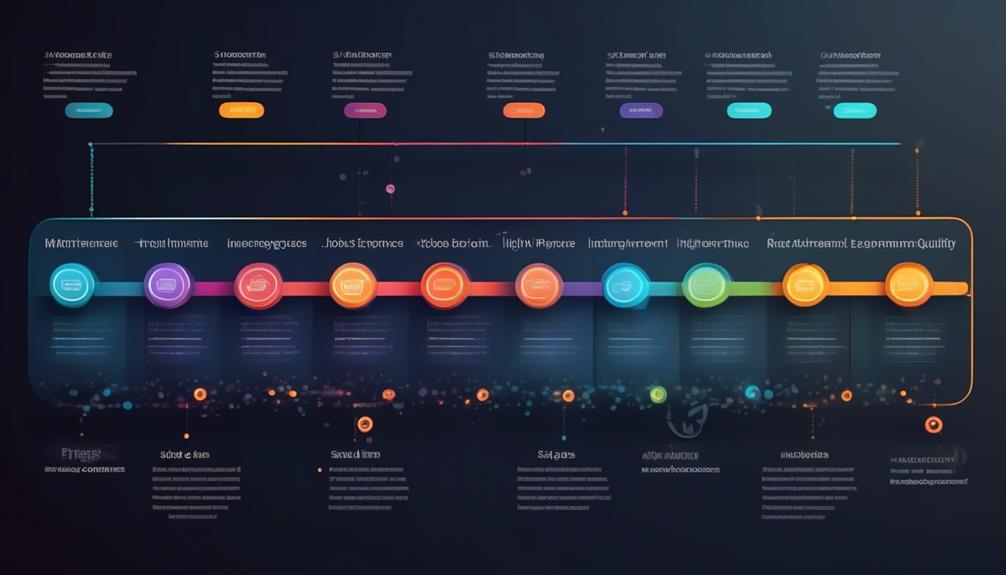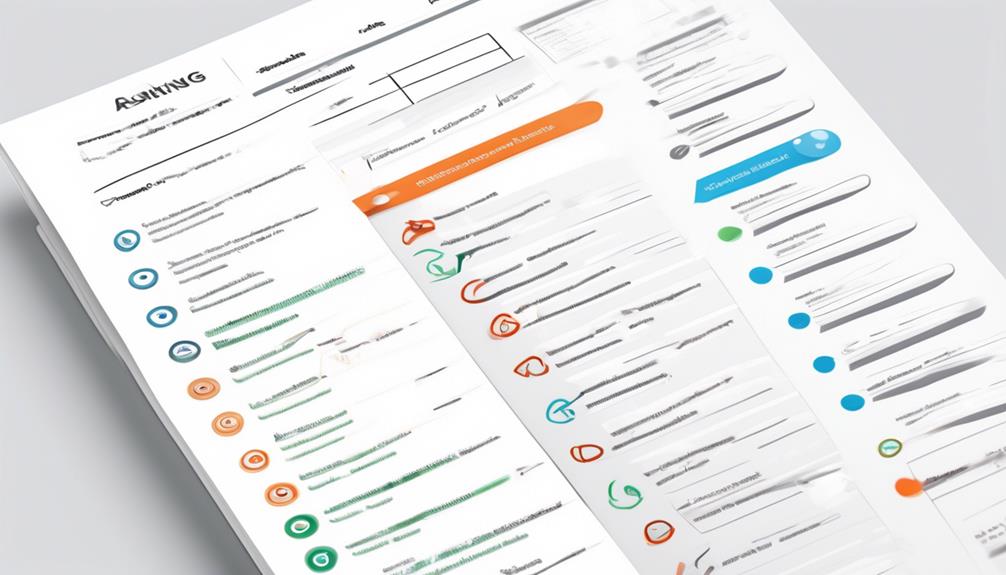Therefore, it is essential to recognize the evolving technological landscape and the increasing demands for top-notch products when establishing the fundamental requirements for roles in software quality assurance.
With the ever-changing nature of software development, a keen eye for detail, strong analytical skills, and the ability to adapt to new technologies are crucial.
But what exactly are the specific qualifications and skills that employers are looking for in this field?
Let’s explore the key elements that make up the standard requirements for software quality assurance jobs and how they contribute to the overall success of software development projects.
Key Takeaways
- Educational qualifications for software quality assurance jobs typically include a bachelor’s degree in computer science or a related field, with a master’s degree preferred for advanced roles.
- Technical skills needed for software quality assurance jobs include proficiency in programming languages like Java, Python, or C++, understanding of software development methodologies like Agile or Waterfall, experience with test automation tools like Selenium or JUnit, familiarity with version control systems like Git, and knowledge of database management systems and SQL.
- Industry certifications in software quality and QA testing are highly valuable and demonstrate competence and expertise in the field.
- Soft skills such as effective communication, strong time management and problem-solving skills, patience, perseverance, and exceptional analytical and critical thinking skills are also important for success in software quality assurance jobs.
Educational Qualifications
When pursuing a career in software quality assurance, obtaining a bachelor’s degree in computer science, software engineering, or a related field is essential. These educational backgrounds provide a strong foundation in technical skills, programming languages, and software development processes, which are crucial for excelling in the field of software quality assurance (QA).
A comprehensive understanding of software testing, quality assurance methodologies, and technical expertise are imparted through these degree programs, thereby preparing individuals to undertake the responsibilities of a software quality assurance engineer.
Furthermore, pursuing a master’s degree in software engineering or a related field can open up advanced roles and leadership positions in the field of software quality assurance. Completing coursework focused on software testing, quality assurance methodologies, and programming languages equips individuals with the necessary skills to thrive in a QA job. Practical experience gained through internships, co-op programs, or relevant coursework projects further enhances the understanding of software quality assurance processes.
Continuous learning and staying updated with industry trends and advancements are also essential for individuals aspiring to succeed in the field of software quality assurance.
Technical Skills

To excel in the field of software quality assurance, a QA engineer must possess a diverse set of technical skills essential for efficient testing and quality assurance processes.
Proficiency in programming languages such as Java, Python, or C++ is crucial for creating and maintaining automated test scripts.
Additionally, a strong understanding of software development methodologies, including Agile and Waterfall, is necessary to align testing processes with the overall development lifecycle.
Experience with test automation tools like Selenium, JUnit, or TestNG is essential for effectively conducting and managing automated testing.
Furthermore, familiarity with version control systems such as Git and continuous integration tools like Jenkins is important for integration testing and ensuring the seamless integration of code changes.
QA engineers should also have a solid knowledge of database management systems (DBMS) and SQL to perform testing related to data integrity and backend functionality.
These technical skills are fundamental for QA engineers and software testers to effectively contribute to software quality assurance and meet the industry standards set by organizations such as Software Quality (CMSQ) and Software Testing (CAST).
Industry Certifications
Building on the foundation of technical skills required for software quality assurance, industry certifications serve as a validation of expertise in specific areas of QA testing methodologies and tools.
As a Software Quality Analyst, obtaining industry certifications such as Certified Software Quality and QA testing can significantly enhance the credibility and proficiency of the QA team. These certifications provide a structured framework for understanding the best practices and standards in quality assurance, which is essential when working on intricate software products. They also demonstrate the necessary skills and knowledge needed to effectively test products and ensure their quality.
In a constantly evolving industry, having industry certifications can set individuals apart and demonstrate their commitment to staying current with the latest advancements in QA methodologies. Furthermore, many employers specifically look for candidates with industry certifications, as they serve as a benchmark for competence and expertise.
Ultimately, industry certifications are a crucial asset for professionals in the field of quality assurance, providing a recognized standard for their skills and capabilities.
Relevant Work Experience

With a keen focus on detail-oriented and organized experience, the role of relevant work experience in software testing and quality assurance encompasses various critical responsibilities.
- Comprehensive Understanding: Our relevant work experience involves having a comprehensive understanding of software QA principles, methodologies, and practices, which is crucial for effectively contributing to quality management processes.
- Test Scenarios Development: We’re adept at developing both manual and automated test scenarios to ensure the functionality and performance of the software product, demonstrating our ability to adapt to the evolving technological landscape.
- Collaboration with Development Team: Our experience includes working closely with the development team to plan, design, and execute testing procedures at various stages of software development, showcasing our capability to integrate quality assurance seamlessly into the development process.
- Critical Thinking and Problem-Solving: Our relevant work experience highlights our critical thinking and problem-solving skills, essential for identifying, analyzing, and resolving issues to ensure software compliance with company and regulatory standards, ultimately contributing to the overall success of the software product.
Our relevant work experience not only demonstrates our professional development but also our ability to meet the demands of the software QA industry, making us valuable assets as test engineers.
Soft Skills
Our relevant work experience in software testing and quality assurance has equipped us with a strong foundation in technical skills. Now, we turn our focus to the essential soft skills required for excelling in this role.
As a software tester or QA professional, effective communication skills are crucial. They allow us to collaborate with software development teams and stakeholders to convey quality standards and project progress.
Additionally, strong time management and problem-solving skills are necessary. These skills help us juggle multiple tasks and find solutions to issues and bugs efficiently.
Patience, perseverance, and follow-through are also vital soft skills for the role. The industry is constantly changing, and QA professionals need to adapt and persist in solving complex problems.
Advanced research skills are essential for gathering and interpreting information to investigate and correct design flaws. Exceptional analytical and critical thinking skills are also required to ensure software quality and efficiency.
These soft skills, combined with technical expertise and possibly an associate degree or certification by national organizations, are essential for excelling in a tech job within the constantly evolving software QA industry.
Frequently Asked Questions
What Are the Requirements for Sqa?
We need to consider various aspects for SQA roles.
Technical qualifications are important, such as a degree in computer science or related fields, extensive knowledge of software development lifecycle and testing methodologies, proficiency in programming languages and test automation tools.
In addition, strong analytical and problem-solving skills are necessary for identifying and resolving software issues. Effective communication abilities are also crucial for effectively collaborating with other team members and stakeholders.
Having these requirements is essential for ensuring the successful planning, implementation, and execution of software testing processes.
What Is the Qualification for Software Quality Assurance?
We require a bachelor’s degree in computer science or related field.
We also require a strong understanding of software testing methodologies and tools.
Proficiency in programming languages such as Java, Python, or C++ is necessary.
Familiarity with industry standards and best practices in software quality assurance is also required.
Excellent communication and teamwork skills are important to collaborate with developers and stakeholders.
These qualifications ensure that our team is equipped to deliver high-quality software products.
What Is Standard in Software Quality Assurance?
Standard requirements in software quality assurance encompass:
- Proficiency in manual and automated testing
- Bug identification
- Collaboration with development teams
Familiarity with ISO 9000, CMMI, and TMMi for process improvement and quality management is essential. Adherence to Software Quality Assurance Plan (SQAP) procedures, techniques, and tools ensures product alignment with requirements.
These requirements are vital for ensuring the delivery of high-quality software products.
What Are the Qualifications for Qa?
Qualifications for QA roles demand a blend of technical prowess and hands-on experience. Obtaining professional certifications, like CSQE through ASQ, and refining technical skills through self-study and coding bootcamps are vital.
Practical experience gained from internships or contractual positions is also crucial. Specializing in a programming language and acquiring coding and software development knowledge, whether through college or self-study, are key elements.
Conclusion
In conclusion, pursuing a career in software quality assurance requires a blend of technical expertise, industry knowledge, and strong communication skills.
It’s like being the conductor of an orchestra, ensuring that all the different instruments (or components) come together harmoniously to create a beautiful symphony (or reliable software).
By meeting the standard requirements and continuously honing these skills, one can excel in this dynamic and crucial role.









